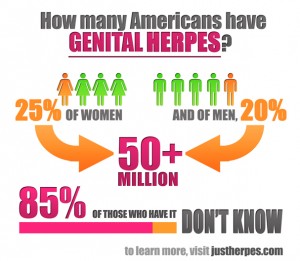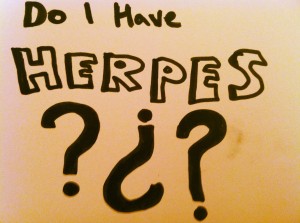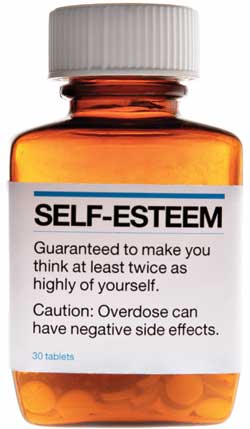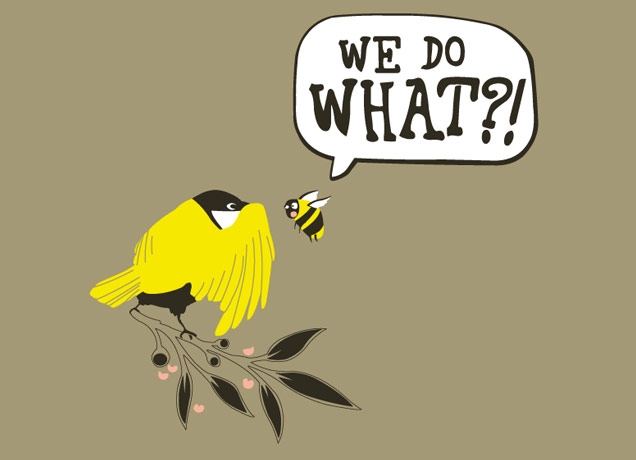A Personal Take on Herpes: Stigma, Risk & Safer Sex by TheWisdomCube
Personal Introduction:
About a year ago I went through the process of defining my relationship with herpes. Not my herpes (I don’t have it as far as I know – more on that later), but everyone else’s. Herpes seems to be responsible for so many tears and so much anger and heartache. Worse, it’s incurable, infectious, common and not nearly as preventable as bloodborne pathogens such as HIV. Scary stuff, but after doing some research and some soul searching, I finally came to the conclusion that I would take some precautions (condoms, washing, avoid contact during outbreaks and preferably have my partner take antivirals) and stop worrying about it. The stigma around herpes greatly exceeds the level of concern warranted by the medical reality of it. I write this in an attempt to collect my thoughts and share my perspective with anyone who wants to read it.
A few notes before I go further:
This is an article about herpes and the operating assumption is that herpes is THE ONLY concern when negotiating sexual contact. Obviously there are plenty of other STIs to be concerned about.
For the remainder of this article, I am going do an experiment. I’m going to refer to herpes as “moops” (HSV1 (Herpes simplex virus 1) and HSV2 (Herpes simplex virus 2) will be referred to as “moops1” and “moops2” respectively). Maybe we can remove some of the power the word has.
Most of the transmission research I found was with respect to heterosexual sex. It was more readily available and it happened to be more relevant to me personally. I apologize for not being more thorough with respect to homosexual transmission.
Gential Moops Transmission Rates?
Sadly, there’s a lot of discrepant data about moops transmission rates. However, based on the research I’ve found (see links at the bottom), the transmission rate of moops2 from infected female to uninfected male is about 4% per year of regular sex (avoiding sex during outbreaks). The transmission rate goes down when condoms and/or antivirals are added (down to 1-2% per year). The transmission rate is roughly double that for male to female scenarios. [1] [2] [3]
Personal Testing Status:
At this point, I don’t know if I have moops of any kind. My doctor’s office doesn’t test for moops unless there are symptoms (which I’ve never had). A while back, I asked him “Isn’t that irresponsible? Wouldn’t you want to try to reduce transmission rates by blood-testing the people without symptoms so they don’t spread it?”
My doctor shrugged and basically said it isn’t medically relevant except in rare cases. From a strictly medical perspective, it’s an unnecessary test.
This was an interesting perspective and while I didn’t necessarily agree with it at the time, it got me thinking…
 What am I afraid of, exactly?
What am I afraid of, exactly?
Do the potential symptoms of moops scare me? Or does simply having moops scare me?
It’s important to understand that most people who have moops don’t know it. Most people who do have symptoms only get mild symptoms such as itching and some small sores which decrease in severity and frequency over time. Let’s consider this for a moment: we’re very afraid of a disease that usually does nothing – maybe it will itch occasionally and force you to take a brief sexual hiatus. Granted, some people do get severe symptoms which are not to be ignored, but I ask myself:
“Does the possibility of contracting moops AND the subsequent possibility of having severe symptoms scare me?”
I say, “No.” To me, the personal medical implications of moops are simply not scary. I know it CAN have severe symptoms, but I really don’t think this why most of us are afraid of moops.
When it comes to moops, I’ll tell you what actually scares me. I’m scared that for the rest of my life, every time I meet a potential partner, I’ll have to have that conversation. I’m afraid that I will forever face rejection, shame and regrets for not having been more vigilant in avoiding moops.
In other words, I’m not really afraid of contracting moops with respect to my own safety. There are far scarier things to worry about when it comes to my own safety (e.g. driving on I-5 every day, skiing, getting my pilot’s license). For me, it’s the STIGMA around moops that I wrestle with and the fear that having moops will make me ‘damaged goods’ in the eyes of potential partners.
Hypothetical: If you knew that you could catch moops, but somehow couldn’t transmit it to others, how afraid of it would you be?
Who has Moops?
As far as I’m concerned, everyone has it – or at least I treat them like they do and they should probably do the same to me. 50-80% people have moops1 and 20-25% of people have moops2. [4] And again, most people who have it don’t know it and many doctors won’t test for it unless symptoms are present.
How can one be sure to never contract moops?
Abstinence (not for me, thanks) or a strict “no outside partners” rule with thorough testing will theoretically work. However, these situations do not work for everyone.
The logistics of making sure you are never exposed to moops in any kind of open poly situation are a nightmare. How do you make sure that none of your partners’ partners’ partners have moops? In my opinion, it’s not ever worth trying – accept that there is some level of risk present, consider taking precautions and move on.
Moops and Kissing?
You can contract moops from kissing (moops1 is typical but not exclusive). This is how most people get it and it’s so common that we use terms like “cold sores” to downplay the fact that the infected individuals have a bona fide STI.
Question: Am I not going to kiss people unless they show me that they test negatively for moops and promise that they haven’t kissed anyone else since they were last tested?
Answer: This is an overly cautious way to live one’s life in my humble opinion. Isn’t life simply better not being afraid of kissing people, moops or no moops? I’m just not that afraid of “cold sores” and giving up kissing seems like a steep price.
Moops and Oral Sex?
Scenario 1: Receiving oral sex from someone who has moops1 on their lips:
It’s possible you could get moops1 on your genitals this way – it’s not that uncommon. [5] Do I find this to be a scarier prospect than getting moops1 on my lips from kissing? No, it’s merely a different part of my body. The addition of the term “genitals” shouldn’t really change anything. At least it’s hidden if it’s on my genitals rather than my lips.
Scenario 2: Receiving oral sex from someone who has moops2 on their lips:
Oral moops2 is rare, but it happens. However, the answer is the same as above. The differences between having moops1 or moops2 on your genitals are fairly minor. At the end of the day, you have still have moops on your genitals. Upon revealing this to a potential partner, they’re not likely to say “Oh, that kind of moops on your genitals is fine. The other kind of moops is the one I watch out for.”
Scenario 3: Performing oral sex on someone who has moops2 on their genitals:
Oral moops2 is rare, but it happens. I’m not going to lose sleep over this one – it’s a small (non-zero) risk of contraction.
Scenario 4: Performing oral sex on someone who has moops1 on their genitals:
I don’t consider this to be fundamentally different from kissing someone who has moops1 on their lips. It’s possible that I get moops on my lips in either scenario. I’ve made my peace with kissing people, so…
Moops and Genital-Genital Sex
My fear of contracting moops through genital-genital sex has to be compared to my fear of contracting moops via kissing. I don’t logically consider those fears to be very different, but I think I’ve been conditioned to think that having genital anything is scary. If you have moops, regardless of where and of what variety, you have an infectious disease that can be transmitted through intimate contact.
That being said, when deciding whether or not to take on regular partner who has moops2, the question can be restated as the following:
“Am I willing to take a 2% per year risk (assuming condoms and abstaining during outbreaks) of acquiring a low-risk (and probably asymptomatic) disease so that I can pursue a physically intimate relationship?”
My answer: “Hell yes.”
Concluding Thoughts
So, am I completely off-base here? Am I living irresponsibly? Am I the only one who fears herpes mostly because other people fear herpes?
It would be a bad world if everyone had HIV, hepatitis, syphilis or a few others. How bad would the world really be if everyone had herpes? Most people already get one form or another during their life – how afraid should I really be?
The answer: not very.
References:
1. http://justherpes.com/facts/genital-herpes-statisti…
2. http://www.healthassist.net/conditions/herpes.shtml…
3. http://www.ncbi.nlm.nih.gov/pmc/articles/PMC544977/…
4. http://justherpes.com/facts/genital-herpes-statisti…
5. http://www.herpesonline.org/defining-the-difference…
Additional Links:
http://www.cdc.gov/std/herpes/stdfact-herpes.htm
http://www.webmd.com/genital-herpes/pain-management…
http://www.ashasexualhealth.org/uploads/pdfs/FAQ-HS…
http://www.herpesclinic.com/genitalherpes/genitalhe…
http://justherpes.com/dating/herpes-transmission-ra…
http://www.herpes.org/protecting-uninfected-partner…
http://consults.blogs.nytimes.com/2010/06/18/giving…
Cheers,
-Wisdom
This Post was Originally posted on FetLife By Wisdom and for those of you without Fetlife his blog



 What am I afraid of, exactly?
What am I afraid of, exactly?




